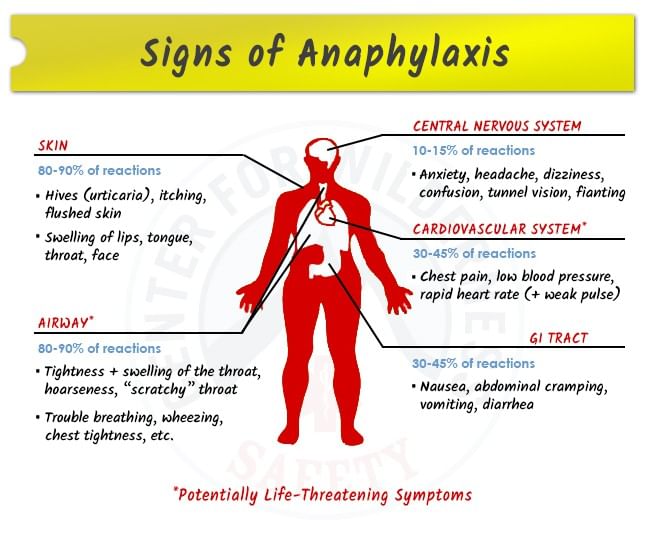An Anaphylactic Shock Which of the Following Occurs
Anaphylactic Shock refers to a severe and life-threatening allergic reaction. Anaphylactic shock is a serious allergic reaction and food is an important causative factor.

Pin By Le Onblows On Medical Sorcery Anaphylaxis Clinic Medical
Anaphylaxis is a severe systemic hypersensitivity reaction that is rapid in onset and characterized by life-threatening airway breathing andor circulatory problems and that is usually associated with skin and mucosal changes.
. Sometimes results in a severe anaphylactic shock response requiring use of an Epi-pen and prompt medical attention but. While most allergic reactions involve only one physiological system the upper respiratory tract or the skin for example anaphylaxis is a cascading response involving multiple systems. 5 In the United States 40 of children with a food allergy experience severe symptoms.
This condition is dangerous. Which of the following clinical signs is unique to anaphylactic shock. Anaphylactic shock is the result of immune system failure due to a toxic exposure.
Symptoms occur within 15 minutes of exposure so its crucial to be familiar with them. When your body goes into anaphylactic shock your blood pressure suddenly drops and your airways narrow possibly blocking normal breathing. It occurs within minutes of exposure to an allergen.
This is a critical condition brought on by a sudden drop of blood flow throughout the body. Someone in anaphylactic shock may also lose consciousness lose bowel or bladder function or experience chest pain. Anaphylaxis can cause shock.
It can occur as a result of eating particular foods taking certain medications or an insect bite. Anaphylactic shock reactions are similar to other forms of medical shock. It occurs within minutes of exposure to an allergen.
This causes the body to go into shock where the blood pressure plummets suddenly and the airways become narrow blocking breathing. Anaphylactic shock can affect a person within seconds or minutes of exposure to the allergen. Terms in this set 45 Hypersensitivity is due to.
In an acute injury setting neurogenic shock is commonly accompanied by. Neurogenic shock occurs when. Symptoms of Anaphylactic Shock.
Anaphylactic shock occurs immediately after a person is sensitized to an allergen. Anaphylaxis is a severe and sudden allergic reaction. Symptoms of Anaphylactic Shock.
Anaphylaxis usually develops shortly after exposure to an allergen. Anaphylactic shock can cause death by restricting the amount of blood and oxygen that reaches organs causing unconsciousness coma cardiac arrest and even death. Anaphylaxis occurs when allergen-sensitized cells in blood and other tissues release large amounts of histamine and other inflammation-causing chemicals.
Subsequent exposure and sensitization often produces a more severe reaction. Anaphylaxis is a severe life-threatening systemic allergic reaction that is almost always unanticipated and may lead to death by airway obstruction or vascular collapse. The chemicals also cause blood vessels to widen dramatically which leads to a rapid severe drop in blood pressure shock.
Anaphylactic shock occurs Immediately after a person is sensitized to an allergen c. Which of the following is true of Type I anaphylactic response hypersensitivity. Anaphylaxis causes a series of symptoms including a rash low pulse and shock which is known as anaphylactic shock.
Metallic taste in the mouth. Anaphylaxis occurs when the immune system releases large amounts of chemicals to fight the allergen. Cardiogenic shock may result from all of the following EXCEPT.
Sensitized people will experience less severe reactions upon subsequent exposure. Anaphylaxis can also cause suffocation due to severe swelling of the. 6 Food-induced anaphylaxis FIA has increased along with food allergies.
Sensitized people would experience less severe reactions upon subsequent exposure d. Failure of the nervous system cause widespread vasodilation. During an anaphylactic shock episode the immune system goes into overdrive and any of the following symptoms may occur.
Occurs when mast cells and basophils degranulate which occurs when IgG bound to their surfaces recognize an allergenic antigen. This reaction varies in severity depending on the amount of allergen exposure. A study in Europe demonstrated that food is the most common cause of anaphylactic shock.
In anaphylaxis these immune chemicals cause serious skin symptoms such as hives and swelling as well as severe breathing problems such as swelling in the throat narrowing of the lower airways and wheezing. Shock is caused by immune system failure due to a toxic exposure b.

Anaphylactic Shock Nursing Care Management And Study Guide Anaphylactic Shock Nursing Study Guide Nursing Care

Comments
Post a Comment